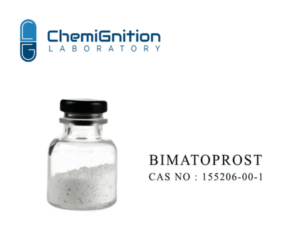
How to source Bimatoprost API from India is a key question for pharmaceutical companies and buyers worldwide. As a global hub for APIs, India offers high-quality, GMP-certified Bimatoprost at competitive prices.
Used in glaucoma treatment, ocular hypertension, and eyelash growth products, Bimatoprost is in growing demand. This guide will help you navigate supplier selection, compliance checks, and sourcing best practices from India.
1. What is Bimatoprost API?
Bimatoprost is a synthetic prostamide analog, structurally related to prostaglandin F2α. It lowers intraocular pressure (IOP) and is used in:
- Treatment of primary open-angle glaucoma
- Management of ocular hypertension
- Cosmetic formulations for eyelash enhancement
Formulations like Lumigan® and Latisse® use Bimatoprost as the active ingredient.
API manufacturers in India provide Bimatoprost to generic drug companies, beauty brands, and global formulators—thanks to their strong regulatory infrastructure and competitive pricing.
Explore a leading manufacturer of APIs.
With over 10 years of expertise, we ensure GMP compliance and provide reliable, high-quality solutions.
2. Why Source Bimatoprost API from India?
India supplies over 60% of the world’s generics and is home to hundreds of GMP-certified API manufacturers. Here’s why buyers choose India for Bimatoprost sourcing:
| Advantage | Explanation |
|---|---|
| ✔ Cost-effective production | Lower labor and infrastructure costs |
| ✔ Regulatory expertise | GMP certified facilities |
| ✔ Bulk production capabilities | Large-scale manufacturing ensures steady supply |
| ✔ Export compliance | Familiarity with EP, BP, USP regulations |
| ✔ Mature logistics & documentation | Experience with customs, COA, MSDS, Stability data, etc. |
India has become the first-choice destination for global buyers looking to source ophthalmic APIs, especially Bimatoprost.
3. Documents You Need to Source Bimatoprost API
To ensure smooth procurement and regulatory approval, make sure your Indian supplier provides:
- Certificate of Analysis (CoA)
- GMP Certificate
- Drug Master File (DMF) Number or ASMF/CEP (If required)
- Material Safety Data Sheet (MSDS)
- Stability data
- Impurity profile and residual solvents data
- Export License & Free Sale Certificate
- Batch size & retest period documentation
A fully compliant supplier should proactively share these to build trust and enable regulatory submissions.
4. Key Quality Parameters for Bimatoprost API
Before purchasing, confirm that the Bimatoprost API meets or exceeds these pharmacopeial specifications:
| Parameter | Requirement |
|---|---|
| Assay (Purity) | 98.0% to 102.0% (as per USP/EP) |
| Appearance | White to off-white crystalline powder |
| Melting Point | 160–170°C |
| Solubility | Practically insoluble in water, but it is soluble in organic solvents such as ethanol and methanol |
| Impurity Profile | Within USP/EP limits |
| Heavy Metals | Below pharmacopeial limits |
| Stability | Stable under ICH-recommended conditions |
Ensure that you receive a recent CoA and, if needed, conduct third-party lab testing for quality confirmation.
5. How to Identify a Reliable Bimatoprost API Supplier in India
Choosing the right supplier goes beyond price. Here’s a checklist to identify a trustworthy and export-ready API manufacturer:
What to Look For:
- GMP approved plant
- Active DMF registration or CEP certification
- Audit-ready facilities (QMS, SOPs, training, batch records)
- Positive customer references in regulated markets
- Ability to handle documentation for EU/US submissions
- Transparent communication and logistics handling
6. Questions to Ask Bimatoprost API Suppliers
Before finalizing the supplier, ask:
- Can you share a GMP certificate and recent CoA?
- What is your monthly production capacity?
- Do you provide custom packaging and bulk shipment support?
- What is your lead time and MOQ (Minimum Order Quantity)?
- Can you support third-party audits or inspections?
- Do you have an active US DMF or CEP for Bimatoprost? (If required)
Asking these helps you avoid non-compliant, low-quality manufacturers.
7. Export Requirements for Bimatoprost API
Indian suppliers exporting Bimatoprost must comply with:
| Requirement | Purpose |
|---|---|
| IEC Code + DGFT Registration | Legally enables exports from India |
| Export License (if required) | For controlled or dual-use substances |
| CoA + MSDS | Required for customs and safety |
| GMP Certificate | Required by most importing countries |
| Customs Documentation | Invoice, packing list, airway bill, etc. |
Chemignition Laboratory ensures full regulatory and export documentation for smooth international shipment.
8. Use Cases & Buyer Profiles for Bimatoprost API
You may be sourcing Bimatoprost API for:
1. Ophthalmic Drug Formulation
- Brands and CMOs making generics for glaucoma and ocular hypertension
2. Cosmetic & Beauty Industry
- Companies producing eyelash growth serums or formulations for cosmetic markets
3. Bulk Traders & Distributors
- Exporters and importers supplying to contract manufacturers worldwide
👉 Indian suppliers like Chemignition support all these segments with tailored pricing and flexible volumes.
9. How Chemignition Laboratory Helps You Source Bimatoprost API
At Chemignition Laboratory, we manufacture and export GMP-certified Bimatoprost API from India, serving clients in:
- North & South America
- Europe (with CEP/ASMF support)
- Middle East and Africa
- ASEAN and CIS countries.
What We Offer:
- High-purity Bimatoprost (CAS No. 155206-00-1)
- GMP, CoA, stability data, MSDS, impurity profile
- Technical and regulatory support
- Flexible batch sizes and MOQ
- Fast, secure international shipping
We help you navigate sourcing, compliance, and shipping—all in one place.
10. Logistics & Delivery Considerations
When sourcing from India, make sure to:
- Choose suppliers with experience in pharma exports
- Verify customs handling capabilities
- Request temperature-controlled packaging, if needed
- Check shipping timelines (usually 7–21 days depending on destination)
Chemignition offers both air and sea freight solutions with global shipping partners.
Conclusion
Sourcing Bimatoprost API from India is a strategic move for pharmaceutical brands, CMO partners, and global formulators seeking high quality, cost efficiency, and regulatory support.
However, choosing the right supplier is crucial. Focus on GMP certification, export compliance, and technical readiness.
📢 Contact Chemignition Laboratory for GMP-certified Bimatoprost API today.
- Request CoA, MSDS, and pricing
- Get documentation ready for EU/US markets
- Bulk and trial orders supported
👉 Reach out to our sales team for a sample or quote now.
FAQs
What are the key quality parameters to consider when sourcing Bimatoprost API?
When sourcing Bimatoprost API, the most important quality parameters include regulatory compliance, purity and potency, stability, microbial limits, residual solvents, impurity profiling, and particle size distribution. Ensuring these factors meet pharmacopeia standards guarantees a safe and effective API for pharmaceutical formulations.
Why is regulatory compliance important for Bimatoprost API manufacturers?
Regulatory compliance ensures that the API is produced under Good Manufacturing Practices (GMP) and meets the safety standards set by US FDA, EMA, and ICH guidelines. Compliance minimizes risks related to quality issues, impurities, and formulation inconsistencies, ensuring the final pharmaceutical product is safe for consumers.
Why choose Chemignition for sourcing Bimatoprost API?
Chemignition is a GMP-certified manufacturer of Bimatoprost API, ensuring regulatory compliance, high purity, and batch-to-batch consistency. The company follows strict quality control measures and provides CoAs, stability data, and impurity profiling reports, making it a reliable supplier for pharmaceutical companies worldwide.
Who is the manufacturer of Bimatoprost?
Chemignition Laboratory is manufacturer of Bimatoprost.



